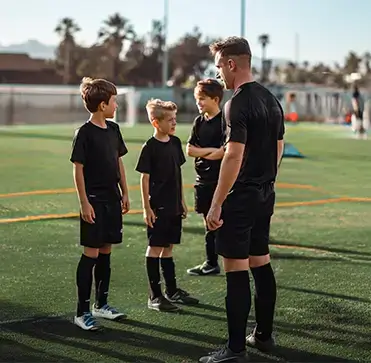Why Positive Coaching Matters in Youth Soccer?

CRFC BLOGS
LATEST BLOGS & NEWSLETTERS
Why Positive Coaching Matters in Youth Soccer?
Youth Soccer Coaching Philosophy
Coaching youth soccer teams demands guts. Guts to stand up for what’s right, guts to prioritize the welfare of young athletes over personal gain, and most crucially, the guts to treat each player with the respect and care they deserve.

Real Insights from Training Young Soccer Players
The narrative unfolds with a pre-ECNL team, a group of under-11 kids who just faced a tough 2-1 loss. Emotions are raw, the sting of defeat palpable. Yet, what transpires post-match is not a moment of collective solace or a constructive critique but a glaring exhibition of a coach’s ego spiraling out of control. The coach’s display of self-importance and mean spirit was on full display. Instead of a collective embrace or at the minimum just team silence this coach helps himself. He makes it personal with a few players in a group setting, belittling and degrading players’ skill, effort, and worth.

To see one of the shaken affected players walking from the group was truly heartbreaking. An 11-year-old was just holding it together, face quivering, with tears just starting in the eyes but not running. When asked what happened she replied, “I was told on many levels by the coach I was not good enough and another player was better than me”. She was still able to hold herself composed in a way reserved for some 15 and 16-year-olds. She truly had decided she would not let people see her cry and break at the moment. Her parents were not at this game to help her. She was on her own other than her friends, and her teammates. And they were there for her. Two of them took both sides of her and walked her to the parking lot arm-in-arm. This was so perverse, that out of their anger for the coach the team bond became stronger. What a way to team bond. The soccer coach’s behavior was so self-serving and mean-spirited. It was disheartening; it’s enraging.
Soccer Coach Behaviors
Over recent months, this coach has morphed, driven by the allure of an ECNL coaching slot. This ambition, however noble in the realm of career progression, has mutated into a grotesque display of power, where the weakest are singled out, criticized, and humiliated. The recent incident with a young, inexperienced player—strong in spirit and loved by peers, yet publicly shamed for her lack of soccer finesse—was the last straw. This isn’t coaching; it’s a cowardly act of bullying under the guise of ‘tough love.’
Soccer Coaching Styles
To every coach, training youth soccer players, out there who thinks it’s okay to belittle and berate kids playing soccer: you’re not just failing as a coach; you’re failing as a human being. It takes zero guts to tear down a child’s self-esteem. It takes zero courage to make a sport, which should be a source of joy and growth, a nightmare for those who dare to try.

Youth Soccer Coach Responsibilities
But here’s where the real guts and youth soccer coach responsibilities come in such as having the bravery to uplift every player, regardless of skill level. Soccer coaching philosophy is all about making hard, dignified decisions that benefit the players and the team—not your ego. IT IS THE PLAYERS TEAM. It’s about communicating with honesty and empathy, recognizing that these are kids, not pawns in your quest for coaching glory.

The real test of courage and actual soccer coach job description includes creating an environment where every player feels valued, where mistakes are seen as learning opportunities, and where the joy of the game is paramount. It is a hard conversation to tell a player and family that a different team would suit them better. But you must have this conversation. It requires no guts, and no class to slowly drop a player by small cuts and personnel attacks.
Qualities of a Soccer Coach
Parents must demand coaches care about what is best for their kids. Qualities of a soccer coach include inspiring and teaching resilience and teamwork, and remembering that at the heart of youth sports is the development of character, not just athletes. It’s on us to stand up and say, “Enough!” to those who believe coaching is about power and intimidation. Parents must stand up and support clubs, teams, and coaches who champion respect, teamwork, and the true spirit of the game.

Conclusion
So, to the coaches out there: Do you have the guts to make youth soccer about the kids again? Or will you continue down a path that alienates and harms the very individuals you’re supposed to uplift? The choice is yours, but remember, the impact of your actions extends far beyond the soccer field.
Register to soccer programs to get a positive coaching experience from our experienced coaches.
FAQs
1. What are the key qualities of a positive youth soccer coach?
A positive youth soccer coach exhibits qualities such as empathy, patience, and the ability to communicate effectively with young players. They prioritize the well-being and development of their players over wins, understanding that building character and a love for the game is paramount. Positive coaches create an environment where every player feels valued, where mistakes are seen as learning opportunities, and where the joy of playing is the main focus.
2. How can coaches effectively communicate with young soccer players?
Effective communication involves clear, supportive, and constructive feedback. Coaches should aim to understand each player’s individual needs and learning styles, offering guidance that is both encouraging and tailored to help them improve. It’s also important for coaches to foster an open environment where players feel comfortable asking questions and expressing concerns, ensuring a two-way dialogue that benefits everyone involved.
3. What strategies can youth soccer coaches use to build team morale after a loss?
After a loss, coaches can focus on highlighting positive aspects of the game and pointing out individual and team growth opportunities. Encouraging team discussions where players can express their feelings and learn from the experience can also be beneficial. Organizing team-building activities that reinforce trust and camaraderie helps maintain a strong, supportive team spirit, emphasizing that losses are part of the game and learning process.
4. How should parents handle a situation where a coach is negatively impacting their child's soccer experience?
Parents should first try to communicate their concerns directly to the coach in a constructive manner, focusing on how their child’s experience could be improved. If the situation does not change, it may be necessary to escalate the issue to the soccer club’s administration, seeking a resolution that prioritizes the children’s well-being and enjoyment of the sport. Parents must advocate for a coaching environment that is respectful, supportive, and positive.
5. What are the 6 stages of positive soccer coaching?
The 6 stages of positive soccer coaching include:
- Empathy and Respect: Treating each player with the respect and care they deserve.
- Positive Communication: Using constructive critique and support instead of belittlement.
- Building Confidence: Fostering a supportive environment that values all players.
- Fostering Team Spirit: Encouraging camaraderie and collective growth from experiences, including losses.
- Developing Character: Prioritizing the personal development of players over the coach’s ambitions.
- Advocacy and Intervention: Encouraging parents and clubs to support coaching styles that focus on respect and positive reinforcement.

Did you find this useful?


